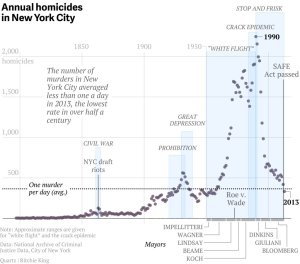
Evolution is just a special case of thermodynamics. Molecules spontaneously arrange themselves to optimally dissipate energy.
Society itself is a thermodynamic system for entropy dissipation. Energy goes in–in the form of food and, recently, fuels like oil–and children and buildings come out.
Government is simply the entire power structure of a region–from the President to your dad, from bandits to your boss. But when people say, “government,” they typically mean the official one written down in laws that lives in white buildings in Washington, DC.

When the “government” makes laws that try to change the natural flow of energy or information through society, society responds by routing around the law, just as water flows around a boulder that falls in a stream.
The ban on trade with Britain and France in the early 1800s, for example, did not actually stop people from trading with Britain and France–trade just became re-routed through smuggling operations. It took a great deal of energy–in the form of navies–to suppress piracy and smuggling in the Gulf and Caribbean–chiefly by executing pirates and imprisoning smugglers.

When the government decided that companies couldn’t use IQ tests in hiring anymore (because IQ tests have a “disparate impact” on minorities because black people tend to score worse, on average, than whites,) in Griggs vs. Duke Power, they didn’t start hiring more black folks. They just started using college degrees as a proxy for intelligence, contributing to the soul-crushing debt and degree inflation young people know and love today.
Similarly, when the government tried to stop companies from asking about applicants’ criminal histories–again, because the results were disproportionately bad for minorities–companies didn’t start hiring more blacks. Since not hiring criminals is important to companies, HR departments turned to the next best metric: race. These laws ironically led to fewer blacks being hired, not more.
Where the government has tried to protect the poor by passing tenant’s rights laws, we actually see the opposite: poorer tenants are harmed. By making it harder to evict tenants, the government makes landlords reluctant to take on high-risk (ie, poor) tenants.
 The passage of various anti-discrimination and subsidized housing laws (as well as the repeal of various discriminatory laws throughout the mid-20th century) lead to the growth of urban ghettos, which in turn triggered the crime wave of the 70s, 80s, and 90s.
The passage of various anti-discrimination and subsidized housing laws (as well as the repeal of various discriminatory laws throughout the mid-20th century) lead to the growth of urban ghettos, which in turn triggered the crime wave of the 70s, 80s, and 90s.
Crime and urban decay have made inner cities–some of the most valuable real estate in the country–nigh unlivable, resulting in the “flight” of millions of residents and the collective loss of millions of dollars due to plummeting home values.
Work-arounds are not cheap. They are less efficient–and thus more expensive–than the previous, banned system.

Smuggled goods cost more than legally traded goods due to the personal risks smugglers must take. If companies can’t tell who is and isn’t a criminal, the cost of avoiding criminals becomes turning down good employees just because they happen to be black. If companies can’t directly test intelligence, the cost becomes a massive increase in the amount of money being spent on accreditation and devaluation of the signaling power of a degree.
We have dug up literally billions of dollars worth of concentrated sunlight in the form of fossil fuels in order to rebuild our nation’s infrastructure in order to work around the criminal blights in the centers of our cities, condemning workers to hour-long commutes and paying inflated prices for homes in neighborhoods with “good schools.”
Note: this is not an argument against laws. Some laws increase efficiency. Some laws make life better.
This is a reminder that everything is subject to thermodynamics. Nothing is free.
[…] Source: Evolutionist X […]
LikeLike
There is an easy answer to urban sprawl but urban Whites would never go for it.
LikeLike
A very good observation. The toll in money and lives exacted by the egalitarian fallacy is drastically underestimated by many people. The trillions of dollars and 60 – 120 million lives poured down the rathole of Communism is only the beginning.
LikeLike
Muh lives lost to Communism
LikeLike
Well, it’s true. Just putting “Muh” in front of a true statement doesn’t exactly refute it, you know.
LikeLike
Moral signaling in the ether. What do “lives lost” really matter?
LikeLike
Thought the book death by government put the toll closer to 300 million dead but I read the damn thing a lomg time ago
LikeLike
Very much a side note, but there’s a fairly large branch of dissident geology/whatever-you-call-it based on the hypotheses that the primary source of petroleum isn’t organic fossilization, but actually inorganic processes in the interaction of crust and mantle.
(https://en.wikipedia.org/wiki/Abiogenic_petroleum_origin)
Doesn’t impinge on your point at all, and I’m not holding it forth as some kind of hidden truth, either. Just thought you might find it interesting.
LikeLike
Also, now that I start looking at that wiki page, it amuses me how much fighting is going on over it. It’s like the biotic origin of petroleum is politically or religiously important … for some reason.
LikeLike
SOMEONE IS WRONG ON TEH INTERNET, that’s why.
LikeLike
Yes, I have noticed this in other sciences as well. Scientists are getting more and more intolerant and dogmatic with regard to their views and theories, even those that have no obvious political or moral import, such as petroleum formation, or string theory. It’s always been this way to some extent, but in the last 20-30 years, it has gotten ridiculous.
Not a good sign for the continuation of good science.
LikeLike
Very interesting, thanks!
LikeLike